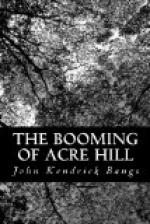All reasonable young authors feel this way after their
first draught at the soul-satisfying spring of publicity.
It is only that preposterous young person who was
born tired who fails to experience the sensations that
were Partington’s that week; and at the end
of the week, again like the reasonable young author,
he began to realize that immortality could not be gained
by one story treating of a fictitious Tommy and an
imaginary huckleberry-tree, and so he sat himself
down at his desk once more, resolved this time to
clinch himself, as it were, in the public mind, with
a tale of “Jimmie and the Strawberry-mine.”
This story did not come as easily as the other.
In fact, Partington found it impossible to write more
than a third of the second tale that night. He
couldn’t bring his mind down to it exactly,
probably because his mind had been soaring so high
since the publication of his first effusion.
For diversion as much as for anything else during
a lull in his flow of language he penned a short letter
to the editor of
Nursery Days, and announced
his intention to send the story of “Jimmie and
the Strawberry-mine” to him shortly—which
was unfortunate. If he had finished the story
first and then sent it, it might have been good enough
to convince the editor against his judgment that he
ought to have it. A concrete story can often accomplish
more than an abstract idea. In this event it
could not have accomplished less, anyhow, for the
editor promptly replied that he did not care for a
second story of that nature. There was no particular
evidence in hand, he said, that the children liked
stories of that kind particularly, adding that the
first was only an experiment that it was not necessary
to repeat, and so on; polite, but unmistakably valedictory.
“No evidence in hand that they are liked, eh?
Well, how on earth, I wonder,” Partington said,
angrily, to himself, “do they ever find evidence
that things are liked? Do they go about asking
subscribers, or what?”
And then he picked up the issue of Nursery Days
that had started him along on his way to immortality,
to console himself, at all events, with the sight
of his published story. In turning over the leaves
of the periodical his eye fell upon a page across
the top of which ran a highly ornate cut which indicated
that there was printed the “Post-office Department
of Nursery Days,” on perusing which Partington
found a number of communications and editorial responses
like these:
I.
“Dear postmaster,—I
have been taking Nursery Days since Christmas,
so I thought I would write you a letter. My
birthday came a week ago Thursday. I received
a watch and chain, a glove-buttoner, a penknife,
and a set of ivory jackstraws. We have a cat
at home whose name is Rumpelstiltzken. He is
very sleepy, and sleeps all day. He always
picks out the most comfortable chair, and then feels
very much injured if we turn him out. I like
Bolivar Wiggins’s story in your last paper
very much. Are you going to have any more stories
by Bolivar Wiggins?
“Your little friend,
“Helen CHECKERBY, aged seven.




